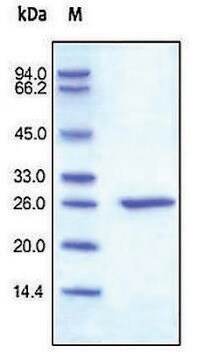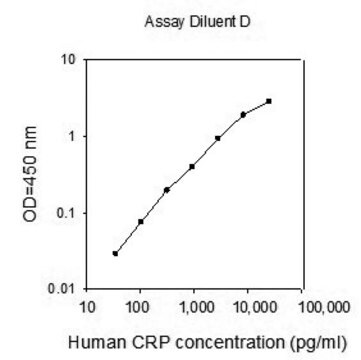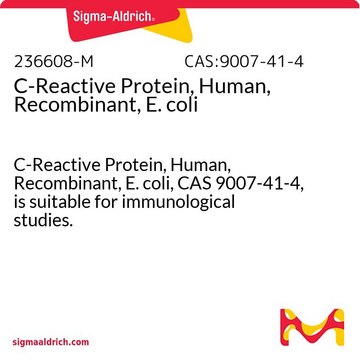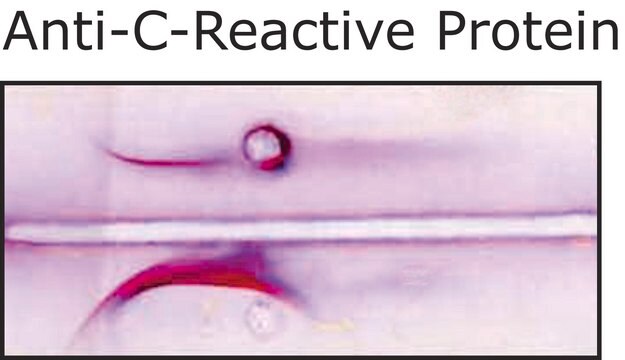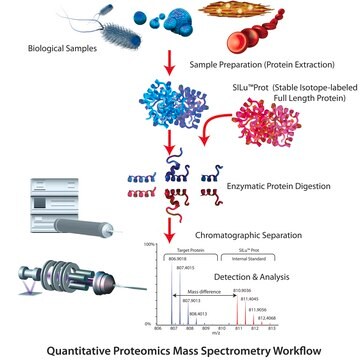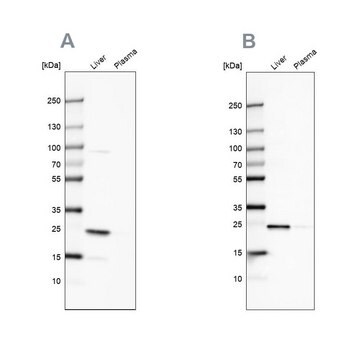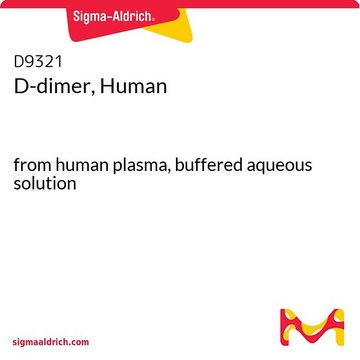Wszystkie zdjęcia(1)
Kluczowe dokumenty
C4063
C Reactive Protein from human fluids
buffered aqueous solution
Zaloguj sięWyświetlanie cen organizacyjnych i kontraktowych
About This Item
Polecane produkty
pochodzenie biologiczne
human fluids
Poziom jakości
Próba
≥90% (SDS-GE)
Formularz
buffered aqueous solution
numer dostępu UniProt
Zastosowanie
cell analysis
temp. przechowywania
2-8°C
informacje o genach
human ... CRP(1401)
Szukasz podobnych produktów? Odwiedź Przewodnik dotyczący porównywania produktów
Opis ogólny
C Reactive Protein (CRP) is a homopentameric protein, which belongs to the pentraxin family. It is produced in liver hepatocytes, smooth muscle cells, macrophages and adipocytes. CRP gene is located on human chromosome 1q23.2.
Zastosowanie
C Reactive Protein from human fluids has been used:
- to investigate the neutrophil extracellular traps (NETs)-dependent generation of monomeric CRP (mCRP) from pentameric CRP (pCRP)
- to evaluate its effects on areas at risk (AAR) of myocardium with ischemia-reperfusion injury
- to measure intracellular levels of reactive oxygen species (ROS)
Działania biochem./fizjol.
C Reactive Protein (CRP) plays a critical role in apoptosis, phagocytosis, nitric oxide (NO) release and the secretion of cytokines, such as interleukin-6 and tumor necrosis factor-α. CRP acts as a marker for cardiovascular diseases, rheumatoid arthritis and cancer.
C reactive protein (CRP) is an acute phase protein. Serum levels in patients with atherosclerosis is predictive of increased risk of myocardial infarction (MI) and stroke. The cytokine IL-6 is thought to be the key mediator in hepatocyte secretion of acute phase proteins including CRP. CRP mediates innate immunity by binding to microbial polysaccharides and to ligands exposed on damaged cells. The binding activates the classical complement pathway (C1, C4, C2, C3 but not C5-9). Opsonization of the substrates leads to their uptake by phagocytic cells and limits the inflammatory response.
C reactive protein (CRP) is an acute phase protein. Serum levels in patients with atherosclerosis is predictive of increased risk of myocardial infarction (MI) and stroke. The cytokine IL-6 is thought to be the key mediator in hepatocyte secretion of acute phase proteins including CRP. CRP mediates innate immunity by binding to microbial polysaccharides and to ligands exposed on damaged cells. The binding activates the classical complement pathway (C1, C4, C2, C3 but not C5-9). Opsonization of the substrates leads to their uptake by phagocytic cells and limits the inflammatory response.
Opakowanie
Package size based on protein content.
Inne uwagi
CRP is isolated from human fluids (Ascitic/Pleural).
Postać fizyczna
Solution in 0.02 M Tris, 0.28 M sodium chloride, 0.005 M calcium chloride, pH 7.8 - 8.2, containing 0.1% sodium azide.
Komentarz do analizy
Protein determined by Lowry.
Oświadczenie o zrzeczeniu się odpowiedzialności
RESEARCH USE ONLY. This product is regulated in France when intended to be used for scientific purposes, including for import and export activities (Article L 1211-1 paragraph 2 of the Public Health Code). The purchaser (i.e. enduser) is required to obtain an import authorization from the France Ministry of Research referred in the Article L1245-5-1 II. of Public Health Code. By ordering this product, you are confirming that you have obtained the proper import authorization.
Ta strona może zawierać tekst przetłumaczony maszynowo.
Kod klasy składowania
10 - Combustible liquids
Klasa zagrożenia wodnego (WGK)
WGK 3
Temperatura zapłonu (°F)
Not applicable
Temperatura zapłonu (°C)
Not applicable
Wybierz jedną z najnowszych wersji:
Masz już ten produkt?
Dokumenty związane z niedawno zakupionymi produktami zostały zamieszczone w Bibliotece dokumentów.
Klienci oglądali również te produkty
Eun Na Kim et al.
PloS one, 14(5), e0216610-e0216610 (2019-05-08)
Prognosis of myocardial infarction tends to be worse when serum C-reactive protein (CRP) level is high. miRNAs are also known to be involved in different pathogeneses of heart diseases such as myocardial infarction. However, how CRP is involved in myocardial
Yoshiko Fujita et al.
Clinical chemistry, 55(2), 285-294 (2008-12-17)
C-reactive protein (CRP) exerts biological activity on vascular endothelial cells. This activity may promote atherothrombosis, but the effects of this activity are still controversial. Lectin-like oxidized LDL receptor-1 (LOX-1), the oxidized LDL receptor on endothelial cells, is involved in endothelial
Sofia Ramiro et al.
Annals of the rheumatic diseases, 73(8), 1455-1461 (2014-05-09)
To analyse the long-term relationship between disease activity and radiographic damage in the spine in patients with ankylosing spondylitis (AS). Patients from the Outcome in AS International Study (OASIS) were followed up for 12 years, with 2-yearly clinical and radiographic assessments.
Alice S Ryan et al.
Journal of the American Geriatrics Society, 62(4), 607-614 (2014-03-19)
To examine the relationships between plasma and tissue markers of systemic and vascular inflammation and obesity and insulin resistance and determine the effects of aerobic exercise training plus weight loss (AEX+WL) and weight loss (WL) alone on these biomarkers. Prospective
C-reactive protein promotes atherosclerosis by increasing LDL transcytosis across endothelial cells
Bian F, et al.
British Journal of Pharmacology, 171(10), 2671-2684 (2014)
Nasz zespół naukowców ma doświadczenie we wszystkich obszarach badań, w tym w naukach przyrodniczych, materiałoznawstwie, syntezie chemicznej, chromatografii, analityce i wielu innych dziedzinach.
Skontaktuj się z zespołem ds. pomocy technicznej


